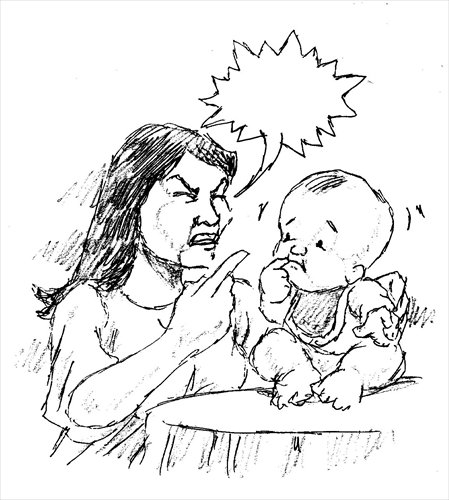Increased ‘Chinglish’ phrases sign of globalization

Illustration: Peter C. Espina/GT
While learning English at school, almost every Chinese student has been taught by their teachers to cultivate a "Western way of thinking," and also told that this is the key as well as the biggest barrier to getting a good command of this language.
This Western way of thinking, which is another expression for how English is used, is acquired by few students. Most Chinese English learners have to transcode Chinese into English in their minds when they speak. The more skillfully they can transcode, the more proficiently they can use it.
But transcoding will probably become an unnecessary process when Chinese people speak English in the future. Some local and grass-roots Chinese buzzwords are gaining popularity among native English speakers.
As an open and inclusive language, English has taken in many Chinese words and expressions. Words like tofu, kowtow and mandarin, all have Chinese origins. But in recent years, the infiltration of Chinese in English is getting stronger.
Some Chinglish expressions, most of which are just word-to-word translation - literally poorly done - have attracted attention from the English-speaking world.
Urban Dictionary, a popular Web-based dictionary, has become the frontline where these Chinese buzzwords are taken from. Recently, Chinese Internet users have found a few popular catchphrases in this dictionary and posted them on Chinese social media, where they've become a hit.
Besides the familiar expressions "people mountain, people sea," which means a great number of people, and "long time no see," which means "haven't seen you for ages," new buzzwords like "no zuo no die," "you can you up, no can no bb" have been included.
"No zuo no die" is a bizarre but interesting combination of Chinese culturally specific words and ungrammatical English translations. According to Urban Dictionary, it means if you don't do stupid things, they won't come back and bite you in the ass.
Zuo is actually a Chinese dialectal character meaning "do unnecessary things which result in troubling oneself."
"You can you up, no can no bb" is accepted by the dictionary under the same framework. Short as it is, it contains rich information, meaning "if you can do it, you should go up and do it; if you cannot do it, then stop criticizing others."
But interestingly, bb is also a Chinese dialect-based term, and there is even debate about which specific Chinese characters can represent it. It seems that English has come first and worked out a corresponding translation.
It is the job of linguists to explore why English and Chinese have mingled in this way and how it can influence the development of the two languages. As ordinary people, we can feel the acceleration of such mingling, which exudes a stronger influence over our daily life.
It's still too early to define whether the tendency is positive. Some worry that too many loan words and exotic expressions will damage the independence of a language, but some believe it further proves the irreversibility of globalization.
The popularity of a language is probably the best parameter to test how much influence the language's country can have over the world. It is possible that Chinglish will be treated less as a negative example of English misuse, since an increasing number of Chinglish words and expressions are being accepted by mainstream native speakers.
No matter how many Chinese buzzwords go to English in the future, they are the natural result of the increasing interactions between two different societies. Most of them would probably just be passers-by in the long evolution of English, but they are the witness to the integration of the whole world.
The author is a Global Times reporter. liuzhun@globaltimes.com.cn